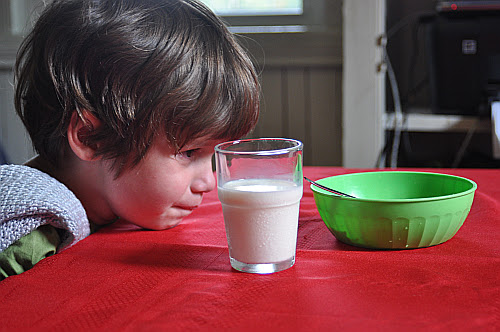It starts out innocently, but with intention.
I choose something I know she likes (like the lovely stew that she ate with gusto at dinner last night). I don't overload her bowl, so as not to overwhelm her.
I place a pretty red cloth on the paint-covered table. I give her a choice of beverages, and she chooses milk.
Then it begins.
The refusals. The whining and protesting. The anti-stew tirade. She just CAN'T feed herself. Would I PLEASE feed her? Can she PLEASE lean on me while I eat?
I place a morsel on her spoon, then leave it in the bowl for her to carry to her mouth. She hits the spoon, hard, so that the piece of beef catapults across the kitchen. I find myself trying not to giggle with astonishment at her spirit, as I listen for the sound of it landing somewhere near the fridge.
Then I'm the meanest mother ever. Margot ate her stew, so SHE'S the winner. "So I'M the LOSER!!", she wails.
I reassure her that the treat we were given at the library (my prize for identifying three poets from their portraits...but I digress) is sitting on the counter, waiting for when she's done.
It's just so unfair!
I reduce the amount I've given her by half. Then all gets quiet as I putter around the kitchen. Margot has had her treat and is almost ready for her nap. I wonder how long she'll last in this showdown that happens all too often.
A nutritionist friend once wisely told me that when it comes to food, it is a parents job to decide WHAT and WHEN. It is the child's job to decide WHETHER and HOW MUCH. I am very aware of all the possible issues that can arise when the dinner table becomes a battleground of stubborn wills, the parents insisting that the child clean her plate, the tears mixed with snot as the hated food is shovelled in against her will. The bribes for treats. The ensuing eating disorders.
I generally don't worry too much about how much she eats, as she has always been "selective". This is the child that would eat pasta with butter and Parmesan cheese, and warm milk for every meal. Or buttered bread. She grows slowly, and is small for her size. She was a hearty breast feeder, but took to solids reluctantly.
Every meal is an exercise in faith and patience, optimism and perkiness. "Eating healthy food will help you grow strong and well!" "You sure liked this stew last night!" "When we're all done eating, we'll go for a walk to see the horses!"
Not that we're perfect. There have also been bribes of treats and threats, in our more worn-down moments.
Food is such a primal issue. We all remember our mothers admonishing us with tales of "the starving children of Biafra". I've managed to avoid that ineffective argument so far; my kids are still confused about the concept of "Canada", so Biafra (or Ethiopia or Somalia) are abstract concepts at best.
We want our children to eat and grow. We want them to be grateful for what we have. We want them to appreciate the work that goes into growing and preparing food. And of course we all want that perfect scene of the family happily joining together to dine at the end of a busy day.
We've started lighting a candle at dinnertime, to symbolise the warmth and joy of joining together, and to signal the beginning of this daily event. We always hold hands and say a blessing. We parents listen to endless made-up jokes that make no sense.
But sometimes it just ain't peaceful.
She contemplates her options. If she eats the three pieces of potato and the three pieces of meat, a segment of chocolate is hers. With me quietly peeking (and sometimes photographing), I see her resolve crumble. She tells me, "I'm going to eat this now", then begins to eat. It takes all of three minutes. She is once again happy and calm, and delighted with her efforts.
I wonder why she makes things so difficult for herself. I wonder if I went too long between meals/snacks (today was library day, so our morning snack was missed) and that made her momentarily crazy. I kick myself for even mentioning the treat (they saw it sitting on the library counter), and wonder if I set her up to have a tantrum, her judgment clouded by the promise of chocolate.
I want her to trust her body, so I only offer healthy food through the day. I often put bowls of food on the table and let her serve herself so that she gets to know what she likes, and feels empowered by choice. With my own tendency to shovel food in whether I'm hungry or not, I trust in the wisdom of letting her decide
whether and
how much.
I have gradually let go of my need to
control this aspect of her life (i.e. the "I-made-this-and-you're-damned-well-going-to-eat-it!" syndrome so common among working mothers!). My brother-in-law, who grew up in a home with six siblings, tells me that in his house, there were always two choices for dinner:
take it or leave it. My best friend is a mother of five, and she does not give her children snacks. They eat three hearty meals a day, and they all EAT what is offered, because they're not in the habit of grazing through the day.
In our house, it is hard to make the kids sit at the table through a whole meal. We are gradually teaching Jude that he needs to stay at the table to eat. My girl, in this case, was free to meander about. She was in no way forced to eat. She had to come to the realisation, though, that we cannot eat treats if we don't have healthy food in our bodies first.
I know I'm not alone. Weigh in, mamas...tell me about your food battles, your best-bet meals, your own memories of dinner time as a child. It is so profound and emotion-laden. I'm not sure how to best avoid the whole meal time showdown with this one child of mine to ensure that she grows up with a healthy sense of what her body wants and needs.
In the meantime, I'm thinking I'll cook some pasta for dinner tonight.



















































